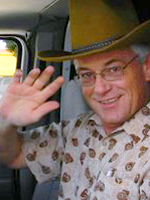Finding solace in a timeless canyon
Leon Worden · May 7, 1997
PICO CANYON -- The birds are having quite a conversation this afternoon, squawking at one another in the limbs of the gnarled oaks that tower overhead. A sudden gust sends dried leaves to the valley floor, already matted with a billion others that form a bedding for new saplings that will grow to shelter nesting songbirds 100 years from now.
It is a tranquil place, these hills high above Santa Clarita. It's easy to forget that 150,000 automobiles will ferry their passengers there and back again along the interstate highway today, a day like any other. The mountain peaks block the highway noise completely, and if not for the occasional passing aircraft, you'd think you were at the farthest reaches of the earth.
There is a timelessness here, a permanence. I know I am perched near the epicenter of the aftershocks that rocked us a couple of weekends ago, the strongest since 1994, but I wonder if this canyon even noticed them? Judging from the craggy hillsides, twisted and contorted and thrust into the sunlight as the continental plates crashed together millions of years ago, my guess is no.
The pioneer oil explorers are come and gone from here, just like the hunters and gatherers who trod the selfsame pathways aeons earlier. But for the few ghostly structures of Mentryville below, and tiny Johnson Park, and the markers at the site of California's first commercial oil well, the canyon has gone back to the way it was, reclaiming itself after man's relatively brief intrusion. Its oaks stand fast, its lilacs bloom purple, and a river runs through it.
I have been struggling to make sense of the events of last week. I'm drawing a blank. I did not anticipate that the death of my friend Richard Rioux would affect me so. We are taught to be resilient, expected to get over it, conditioned not to care. To show a chink in the armor is to invite mockery and ridicule. I don't know. I have lost too many friends in recent months, our community too many wonderful people, and I think it's starting to catch up with me.
How do you explain it? It is so grossly unfair. Richard's was one of the purest souls I have known, yet he was not allowed to complete what surely would have been his greatest works. Why shouldn't he be able to watch Natasha and Jeremy grow to adulthood?
And what in God's name did young Heath Taylor do to anyone? He'll never get a chance to test his wings, let alone make his own mistakes. The death of a child seems so random, so senseless.
With each friend I've lost, and I'm sure it is so for the family of Heath Taylor, it is as if a piece of me has been ripped away. It makes me realize how much I need my friends and family. I can't function in a vacuum. No one can.
Baseball's Jackie Robinson is said to have lived by the motto that "life is not important except for the impact it has on others." Richard Rioux would have agreed, although he wouldn't have stated it in the negative. Life IS important BECAUSE of the impact it has on others. I was reminded at Richard's memorial service on Friday that he had said much the same thing a few months ago in a Signal column. "In all that I do," Richard wrote, "I will try to remember the maxim that the final value society places on our lives will be measured by the extent to which we have served others."
Richard lived by that credo, and as I sit amidst the trees and grasses and birds and insects in a canyon that won't care one whit a century from now if we have been here or not, I see that Richard was right. It doesn't explain Heath Taylor, but there is some solace in knowing that before he left, Richard had found the meaning of life.
Leon Worden is a Santa Clarita resident. His commentary appears on Wednesdays.
©1997 LEON WORDEN — ALL RIGHTS RESERVED

